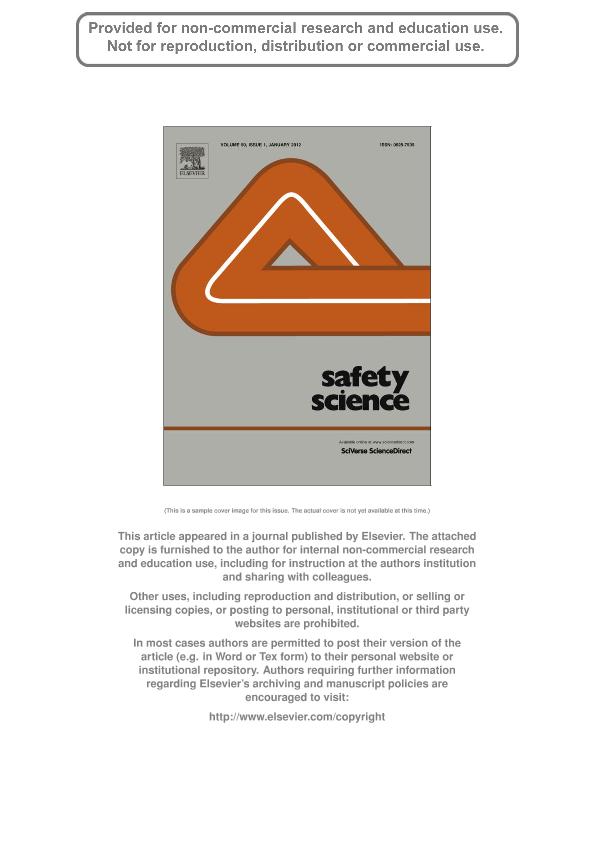Mostrar el registro sencillo del ítem
dc.contributor.author
Soria, Sabrina Andrea

dc.contributor.author
Josens, Roxana Beatriz

dc.contributor.author
Parisi, Daniel Ricardo

dc.date.available
2017-07-12T22:12:54Z
dc.date.issued
2012-04
dc.identifier.citation
Soria, Sabrina Andrea; Josens, Roxana Beatriz; Parisi, Daniel Ricardo; Experimental evidence of the “Faster is Slower” effect in the evacuation of ants; Elsevier; Safety Science; 50; 7; 4-2012; 1584-1588
dc.identifier.issn
0925-7535
dc.identifier.uri
http://hdl.handle.net/11336/20308
dc.description.abstract
The faster is slower effect is a self-organized phenomena first described for pedestrian dynamics. Although it has been obtained in computer simulations, it has not been observed in real systems yet. To achieve this goal, we carried out experiments with ants, which are self-propelled biological agents. The ants were placed inside a bidimensional chamber with a narrow exit, and a paper imbibed with repellent was placed in the opposite wall of the chamber. Using different concentrations of citronella, which produced different degrees of repellency, the ants were forced to egress from the chamber and the evacuation time was measured. A minimum evacuation time is observed for intermediate concentrations of citronella, compatible with the faster is slower effect. However, this effect was not generated by the occurrence of blocking clusters right before the exit as the ants did not display a selfish evacuation behavior.
dc.format
application/pdf
dc.language.iso
eng
dc.publisher
Elsevier

dc.rights
info:eu-repo/semantics/openAccess
dc.rights.uri
https://creativecommons.org/licenses/by-nc-nd/2.5/ar/
dc.subject
Competitive Evacuation Dynamics
dc.subject
Emergency Egress
dc.subject
Pedestrian Dynamics
dc.subject
Biological Agents
dc.subject.classification
Otras Ciencias Físicas

dc.subject.classification
Ciencias Físicas

dc.subject.classification
CIENCIAS NATURALES Y EXACTAS

dc.title
Experimental evidence of the “Faster is Slower” effect in the evacuation of ants
dc.type
info:eu-repo/semantics/article
dc.type
info:ar-repo/semantics/artículo
dc.type
info:eu-repo/semantics/publishedVersion
dc.date.updated
2017-07-12T18:15:38Z
dc.journal.volume
50
dc.journal.number
7
dc.journal.pagination
1584-1588
dc.journal.pais
Países Bajos

dc.journal.ciudad
Amsterdam
dc.description.fil
Fil: Soria, Sabrina Andrea. Universidad de Buenos Aires. Facultad de Ciencias Exactas y Naturales. Departamento de Biodiversidad y Biología Experimental. Laboratorio del Grupo de Estudio de Insectos Sociales; Argentina. Consejo Nacional de Investigaciones Científicas y Técnicas; Argentina
dc.description.fil
Fil: Josens, Roxana Beatriz. Universidad de Buenos Aires. Facultad de Ciencias Exactas y Naturales. Departamento de Biodiversidad y Biología Experimental. Laboratorio del Grupo de Estudio de Insectos Sociales; Argentina. Consejo Nacional de Investigaciones Científicas y Técnicas; Argentina
dc.description.fil
Fil: Parisi, Daniel Ricardo. Instituto Tecnológico de Buenos Aires; Argentina. Consejo Nacional de Investigaciones Científicas y Técnicas; Argentina
dc.journal.title
Safety Science

dc.relation.alternativeid
info:eu-repo/semantics/altIdentifier/doi/http://dx.doi.org/10.1016/j.ssci.2012.03.010
dc.relation.alternativeid
info:eu-repo/semantics/altIdentifier/url/http://www.sciencedirect.com/science/article/pii/S0925753512000732
Archivos asociados
